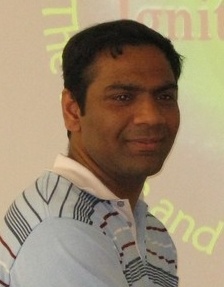Sashi Kanth Tadinada
November 23, 2009

Let me put it this way. Ever since my mom stopped shaking me out of bed and shoving me into the bathroom to get ready for school, there were few classes in which I had 100% attendance. So, what made me attend every class of “Medhajananam”? The answer is very obvious: No taking Notes, no exams, no homework, you don’t even have to sit attentively with a pretentious expression on thy face … plus you need not hide any yawning sensations … If only every class were like this, I guess the problem of education can be solved much faster …
Medhajananam had been an exciting journey, more like a field trip into the concepts of an Indic Philosophy. The framework of AUM, I feel, has a stunning clarity and remarkable relevance to today’s world. The most important aspects I liked about the framework are its overall simplicity, its openness to new ideas and information and lastly, the rationality of its worldview.
The following features of the philosophy struck a chord with me at this point in my life:
* The class helped me understand a great deal about importance and power of religion & mythology and their influence on human society and dynamics.
* The fractal nature of the universe implies the scalability of understanding the same by understanding ourselves and our daily lives and vice-versa. I thought that was an interesting point.
* The most exciting concept that I learnt in the course had to be about the constant interaction of purusha (the “Idea”) and prakriti (the “media”). The limitlessness of an idea being expressed through the finiteness of a media to choreograph the dance of life is an amazing concept in Indic philosophy. The delightful poetic use of colorful symbolism that clothes Indian mythology to express the relationship between prakriti and purusha (examples: the chemistry between Radha-Krishna, Krishna-Satyabhama and the meaning behind the consorts of Brahma, Vishnu and Siva etc.) throws a great light on the fabric of Indian culture.
* The overall emphasis on the intuitive God over the intellectual or the inherited ones was something I found appealing.
* I also find the philosophy quite humanistic in the sense that we have to embrace the diversity of energies we all exude and bring to the drama of life while being conscious of the oneness of everything that pervades this universe. (OM SHANTHI SHANTHI SHANTHI HI). And also, simplistic (Life should be enjoyed in its full capacity. The more we express, the more we further the intent of the universe).
Obviously, any reasonable philosophical framework is a complete consistent web of ideas. The above presented features may not do sufficient justice to the content of the whole course. While, the concepts appear quite simple, I feel that the course has been just an overview to the Indian philosophy and I also feel that it might take years before someone can grasp all this and integrate into their worldview. Today, I am very much like a kid in the chocolate factory. Indic philosophy has just started to entice me. Today, I can only stare with a sense of awe the philosophy that refuses to be obsolete even after 5000 years. There are a lot of broken links, but Medhajananam was a good start to bridge the gap and then hopefully, break my next shell!
I can only wonder at the energy and enthusiasm of the instructor – Mr. Krishna. It is a courageous, self-less, single-handed effort to sift through volumes of ancient scriptures and hand pick this neat, original framework which I believe is a consummation of yourquest spanning 30 years. I am very grateful for the time you spent in making this happen. I wish you all the success with this course and beyond.
Beneath all philosophy lies the all-important human experience. After all, it was a bunch of people hanging out and I admit that I enjoyed every part of it … the diverse opinions of everyone … the playful arguments … the clash of colors (green vs. blue) … sneaking out for coffee … the chai-pakoda breaks … I thank everyone in the group for all the fun.
One last comment. A thought that recurred almost throughout every lecture is “Did they think of all this ? When did they have the time?” My naivety committed my mind into a prejudice that visualized the old society to be busy in agriculture, wars and the daily humdrum of eat-sleep-pray-make merry-have kids routine. I just realized what a distinguished class of people in that era gifted with intelligence and sufficient social ineptitude were doing -they were thinking about the heavens (One reason could be that there were not enough gizmos around) !!!
 Mēdha Jananam
Mēdha Jananam
 Mēdha Jananam
Mēdha Jananam
